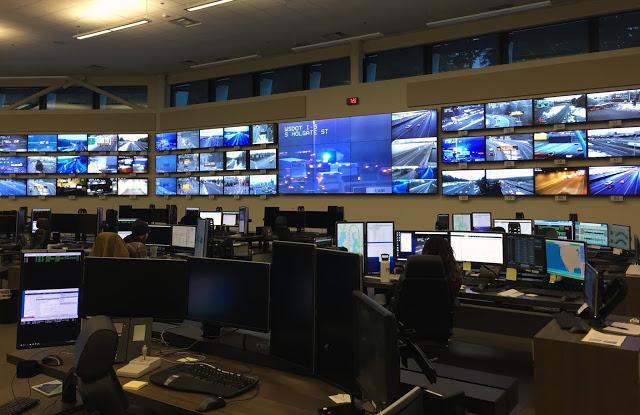Traffic Management Centers (TMCs)
Learn about the central command centers for WSDOT's highway monitoring and response efforts.
Our staff keeps an eye on traffic conditions statewide from six Traffic Management Centers (TMCs) around the state, and a special Winter Operations Center on Snoqualmie Pass. The six TMCs are located in:
- Parkland (Tacoma)
- Shoreline
- Spokane
- Vancouver
- Wenatchee
- Yakima
Our Spokane TMC is unique, in that it is the only TMC that is jointly operated by multiple agencies, including WSDOT.
All of our TMCs operate 24 hours a day, every day, to monitor traffic and to direct and support incident response, in order to keep roads clear and traffic moving safely. TMCs are a critical component of coordinated responses to emergencies anywhere in the state.

What happens at a TMC
TMCs are the nerve center of highway monitoring and operations, and are staffed with engineers, operators, technicians, and additional support and management personnel.
The following are some of the tasks performed by our TMCs and their staff:
- Monitor traffic and identify problems using hundreds of cameras located throughout the state on the highway system.
- Use data from traffic detectors on the highways to observe traffic conditions in real-time, even in areas where cameras may not be available.
- Oversee operations of our ramp meter, reversible lane, and ATDM systems, to help manage traffic flow and reduce congestion.
- Coordinate the activities of our Incident Response Teams.
- Coordinate responses with Washington State Patrol and other law enforcement and emergency response crews when responding to incidents on the highway.
- Provide up-to-the-minute information about what is happening on the highway system, including mountain pass updates, weather conditions, travel alerts, and travel times
Some of the ways we convey information to the traveling public include:
- Variable Message (Electronic) Signs
- The WSDOT Real-time travel data web pages
- WSDOT App and Twitter Feeds
- Highway Advisory Radio System
- Local media stations, such as television and radio traffic reports
AMBER and Silver Alerts
TMCs provide a critical communications link for all emergencies, but are particularly important in the event of an AMBER (missing child) or Silver (missing senior) Alert. When one of these alerts is issued, our TMCs provide messaging to assist drivers in helping to locate the subject of the alert, most frequently on Variable Message Signs around the state.
Slow down on ice and snow.
It's easier to skid or lose control traveling at higher speeds. Give yourself more time to stop.
Carry chains, practice installing them.
Winter conditions could mean chains are required on your route. Practice putting them on your vehicle ahead of time.
Pack your winter car kit.
Carry extra supplies like warm clothing, ice scraper and brush, jumper cables and other emergency items.
